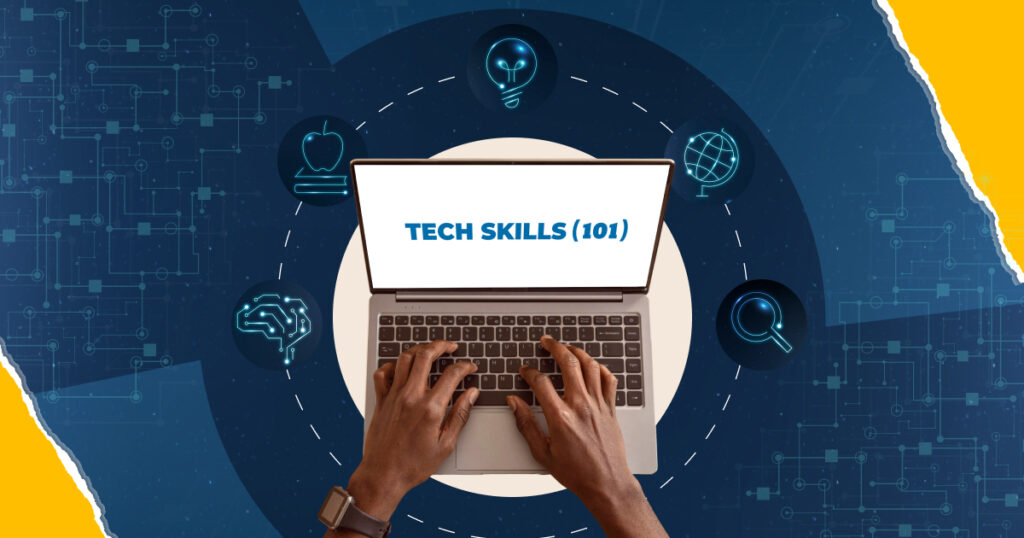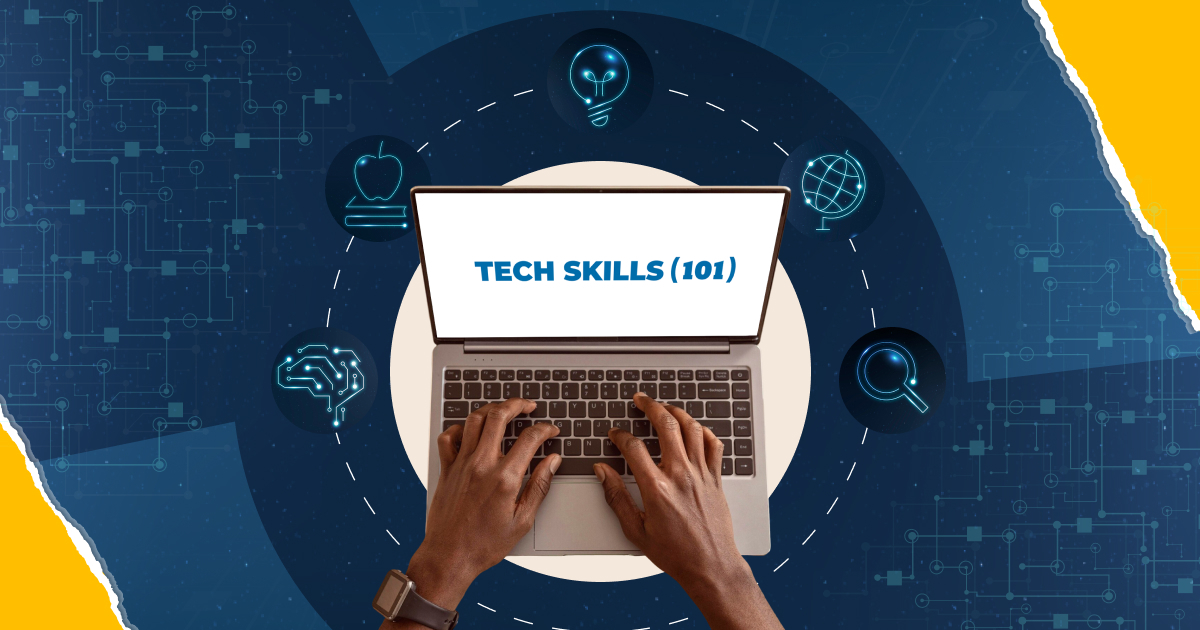Whether you’re a complete beginner or someone looking to transition careers, learning a tech skill can feel like a daunting task—and that’s totally understandable. With so much conflicting information out there, it’s easy to get overwhelmed.

On the one hand, you’ll hear people claiming that “tech jobs are dead, on the other, there’s the fear that “AI is stealing tech jobs.” It’s enough to make anyone second-guess their decision to dive into the tech world.
But here’s the truth: learning a tech skill and entering the tech field isn’t as complicated as it may seem, and it’s absolutely still worth it. The tech industry continues to grow, and with the right approach, anyone can start their journey—no matter their background.
In this post, we’ll break down how to learn tech skills as a beginner, cut through the noise, and explore a strategy that’ll set you up for success.
Is It Worth It to Learn a Tech Skill as a Beginner?
The short answer is yes—tech is everywhere, and it’s shaping almost every industry, from healthcare to finance. Learning a tech skill as a beginner opens the door to countless job opportunities across different sectors.
The best part? Once you build the right skill set, you’ll be set up for a stable career that can last a lifetime. While your first tech job might not come with a six-figure salary, with dedication and the right experience, you can definitely work your way up to that level.
Tech careers are also known for offering flexibility, especially when it comes to remote work. Imagine being able to work from anywhere, whether it’s from home, a coffee shop, or even while traveling. Tech roles often give you the freedom to manage your own schedule, which is a major perk. That said, not all tech skills offer 100% remote work opportunities, so it’s important to choose a skill that aligns with your remote work goals.
Long story short, learning a tech skill as a beginner is totally worth it. The opportunities are endless, and with the right dedication and focus, you’ll be on your way to a rewarding and flexible career in tech.
Now let’s dive into how to learn tech skills as a beginner:
Step 1: Understand Where You Fit in the Tech World
Before we dive into how to learn tech skills as a beginner, we need to first talk about Self-Evaluation. Let’s face it—tech is vast. From software development to UI/UX design to tech roles in HR, finance, law, and sales, there are countless opportunities. So, take a moment to look within and ask yourself: Where do I want to make an impact in the tech industry?
This step is all about evaluating what you bring to the table. Start by assessing your soft skills like problem-solving, communication, or adaptability. Are you good at collaborating with teams? Are you detail-oriented or have a knack for creative solutions? These are skills that will play a key role in tech jobs across all sectors.
Next, take stock of your hard skills (think project management, copywriting, or marketing) and domain expertise (your experience in a specific field, e.g., real estate, or healthcare). For example, if you’re currently working as a front desk personnel, you already have transferable skills such as customer service, technical troubleshooting, and organization. These are all valuable in tech roles like customer support for SaaS companies, IT support, or even as a product specialist.
By evaluating your existing skills and experience, you can determine which area of tech is the best fit for you—whether that’s software development, cybersecurity, or tech-related business roles. This clarity will make it easier to focus your learning efforts and choose the right tech skill to focus on as a beginner.
Step 2: Upskill
Once you’ve reflected on your strengths, weaknesses, and areas of interest in the tech world, it’s time to upskill. At this point, you should have narrowed it down to 2-3 roles you’re interested in, the next step is closing the gap between where you are and where you want to be.
The first step in learning tech skills as a beginner is to create a detailed career roadmap, keeping your current background in mind. For example, if you have a medical background and want to break into healthcare tech, the skills gap may be relatively small. Your expertise in healthcare will mean you’ll only need to focus on learning specific technical skills which makes your upskilling journey quicker.
However, if you’re transitioning from a completely different field—say, as a teacher wanting to transition into software engineering— your roadmap will be longer. You’ll need to learn new skills, such as programming languages and software development concepts, and become proficient with the tools required. This will take time, dedication, and hands-on practice, but it’s absolutely achievable.
Step 3: Pick the Right Resources
When it comes to learning tech skills as a beginner, choosing the right resources can make all the difference. One option is to go back and pursue a 4-year degree in a related field. While this can be time-consuming and costly, it can also be a solid foundation if you can afford it. However, it’s important to note that many tech companies don’t require a degree. They’re more focused on your skills, portfolio, and work experience.
If you’re looking for more flexible and affordable options, online platforms like Udemy, Coursera, and Skillshare offer a wide range of courses, many of which are either low-cost or sometimes free. These platforms give you a chance to explore different tech fields and get a feel for what you enjoy, without making a huge financial commitment.
Another great option is tech bootcamps. These intensive, short-term programs are designed to help you quickly learn specific tech skills, such as web development or data analysis, and often offer career support. They’re ideal for those looking to make a career switch or upskill in a particular area in a short amount of time.
Finding the right resources will depend on your budget, time commitment, and the skill you want to learn, but the possibilities are endless!
Step 4: Build Projects to Showcase Your Skills
Another crucial tip on how to learn tech skills as a beginner is to start building projects. Tech companies care more about the projects you’ve worked on and your portfolio than your degree. So, while you’re learning, don’t just absorb information — apply it! One of the most common ways to do this is by freelancing.
Freelancing allows you to work on real-world projects, solve problems, and add your work to your portfolio, making you more attractive to potential employers.
However, freelancing often involves working independently, which isn’t always reflective of how tech teams operate. To gain experience in team collaboration, consider participating in hackathons. These events allow you to work with people from different tech backgrounds to solve problems together, giving you invaluable team experience.
Plus, hackathons are often sponsored by big companies that are actively looking for talented tech professionals. It’s a win-win for you: you’re competing for cash prizes while learning, and the sponsoring companies may even offer full-time roles to standout participants.
Imagine winning a hackathon and adding that achievement to your portfolio — it’s a surefire way to make you stand out.
By building projects, freelancing, and joining hackathons while learning tech skills as a beginner, you’ll have a portfolio that speaks volumes, giving you an edge when you start applying for tech jobs.
Step 5: Get Certifications
When learning tech skills as a beginner, getting certifications can set you apart, especially if you aim to land a high-paying tech job. But not just any certification — I’m talking about certifications from respected organizations in your chosen field. While online course completion certificates are great for personal progress, they don’t carry the same weight as credentials from industry leaders.
For example, if you’re interested in becoming a cybersecurity analyst, a certification like CompTIA Security+, Certified Information Systems Security Professional (CISSP), or Certified Ethical Hacker (CEH) can make all the difference. These are recognized globally and prove to employers that you’re not just knowledgeable but also qualified to handle critical tasks.
Once you’ve spent time upskilling and honing your knowledge, pursuing a certification can give you a competitive edge. It signals to employers that you know your stuff, and it can open the doors to higher-paying roles. The combination of practical experience, a strong portfolio, and solid certifications makes you a valuable asset in the tech world.
Final Thoughts
Even with the constant headlines about layoffs and the fear of AI stealing jobs (which is largely exaggerated), entering the tech industry is still an incredibly smart move. In fact, global IT spending is projected to hit $5.6 trillion in 2025 — a 10% increase from 2024 — and tech companies are still struggling to fill hundreds of thousands of positions. The rise of AI is only going to create even more opportunities in the tech space, so now is a better time than ever to jump in and get started.
As you learn and upskill, consider focusing on AI-related tech skills. The world is rapidly shifting toward AI, and its influence isn’t going anywhere anytime soon. Whether it’s machine learning, data science, or AI engineering, these skills are likely to be in demand for years to come.
Finally, don’t be afraid to build your network as you go. Put yourself out there, engage with others in your learning journey, and share your progress. You never know what connections you’ll make, and sometimes it’s those very connections that lead to incredible job opportunities. The tech industry is vast, and there’s a place for you in it — if you’re ready to put in the work.
And that’s it for how to learn tech skills for beginners! If you found this helpful, then you can’t afford to miss these articles:
Top 5 In-Demand Tech Skills In 2025 (And How Much You Can Earn With Them); Top 11 No-Code Tech Skills to Learn [2025].
Until next time!
Ciao!
